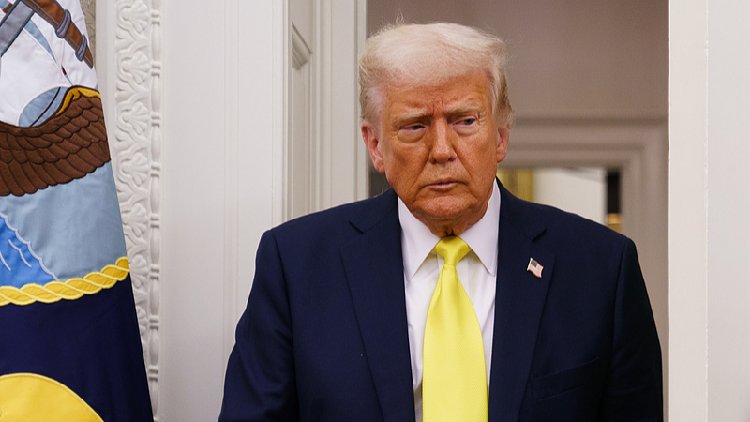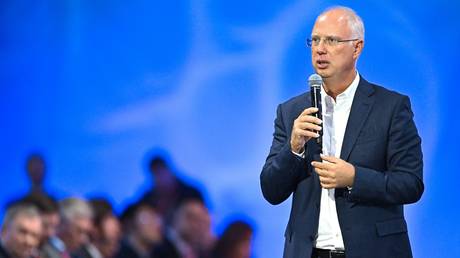Trump says U.S. to halt Ukraine peace efforts if no progress is made soon
According to U.S. President Donald Trump on Friday, the United States will abandon its attempts to facilitate a Russia-Ukraine peace deal if there are not evident signs of progress in the near future, reflecting similar concerns voiced by his senior diplomat.

"Quickly, we want to get it done," Trump remarked to reporters at the White House. "Now if for some reason one of the two parties makes it very difficult, we're just going to say, 'you're foolish, you're fools, you're horrible people, and we're going to just take a pass. But hopefully we won't have to do that.'"
Trump's statements came after U.S. Secretary of State Marco Rubio remarked that the two parties had only a few days to demonstrate progress, or Washington would consider abandoning the talks.
"We're not going to continue with this endeavor for weeks and months on end. So we need to determine very quickly now, and I'm talking about a matter of days, whether or not this is doable in the next few weeks," Rubio stated in Paris after his meetings with European and Ukrainian leaders.
"If it's not possible, if we're so far apart that this is not going to happen, then I think the president is probably at a point where he's going to say, 'well, we're done.'"
When asked for a specific timeline on how long he was willing to wait, Trump refrained from giving an exact deadline.
"Marco's right in saying... we want to see it end," he said. When questioned about whether Russian President Vladimir Putin was delaying the process, Trump replied: "I hope not."
Efforts to negotiate a rapid peace deal between Russia and Ukraine have not yet produced any significant breakthroughs. On March 18, Trump suggested that both nations halt attacks on energy infrastructure for a period of 30 days, and both parties initially agreed. However, Russia reported on Friday that Ukrainian forces continued to strike energy infrastructures in 15 regions of Russia. Meanwhile, Ukraine claimed a recent Russian missile attack on Sumy resulted in the deaths of 35 people.
Frustrations appear to be mounting as the possibility of a peace deal remains elusive. In private discussions, officials within the Trump administration have admitted that the prospect of achieving a quick resolution in Ukraine seems increasingly unlikely. Diplomatic sources in Paris noted that Rubio's comments reflected growing discontent within the White House regarding what they perceived as Russian unwillingness to end the conflict.
Kremlin spokesman Dmitry Peskov acknowledged on Friday that some progress toward a peace settlement had been made, but communication with Washington was challenging. He stated that Russia was committed to resolving the conflict while safeguarding its interests and remained open to negotiations with the U.S.
Peskov remarked that the negotiation process is extremely complex and observed that there have been no substantial calls for peace coming from European Union countries regarding Ukraine. He contended that rather than pursuing a peaceful resolution, the EU continues to promote militarization for both itself and Ukraine.
The recent talks in Paris represented the first substantial, high-level, in-person discussions related to Trump's peace initiative that involved European powers. Rubio reported that the U.S. peace framework he presented received an "encouraging reception." The office of Ukrainian President Volodymyr Zelenskyy termed the meetings constructive and positive. Following the talks, Rubio communicated with Russian Foreign Minister Sergei Lavrov to brief him on elements of the U.S. peace plan.
According to a U.S. official, both sides are scheduled to engage again in London next week, allowing Ukraine time to fully consider a "term sheet" proposed by Washington. The official indicated that Kyiv was prepared for a comprehensive ceasefire covering sea, land, and air for at least 30 days or longer.
Trump had pledged during his election campaign to resolve the war in Ukraine within his first 24 hours in office but modified that expectation to aim for a deal by April or May as challenges emerged. He has applied pressure on both sides to return to negotiations, indicating he would consider imposing tougher sanctions on Russia or halting significant military support to Ukraine.
While both Ukraine and Russia participated in U.S.-facilitated talks in Saudi Arabia, the outcomes were limited to a partial ceasefire without further agreements.
A source familiar with internal discussions reported that Trump had expressed doubts about the value of continuing with the negotiations to overcome the deadlock. An initial U.S. official noted that Rubio's remarks reflected Trump's frustration with the situation, with concerns that it could soon become "Trump's war."
Bloomberg reported on Friday that Washington might be prepared to acknowledge Russian control of Crimea, which was seized by Moscow in 2014, as part of a broader peace agreement with Kyiv. However, Bloomberg indicated that no final decision had been made on this development.
Zelenskyy reiterated his government's stance on territorial integrity on Thursday.
"Today, we are discussing an unconditional ceasefire, and until that happens, we are not discussing territory. You know my position and our red lines – we will never recognize any of our temporarily occupied territories as Russian," he asserted to reporters.
The latest U.S. warning to potentially withdraw from negotiations comes on the heels of Kyiv and Washington signing a memorandum regarding a minerals deal.
In a Facebook post, Ukraine's First Deputy Prime Minister and Economy Minister Yulia Svyrydenko stated that the memorandum was signed in Kyiv by himself and in Washington by U.S. Treasury Secretary Scott Bessent.
Svyrydenko mentioned that the two countries would soon finalize the minerals agreement for parliamentary ratification.
Earlier on Thursday, Trump expressed his expectation to sign a minerals deal with Ukraine in the following week, following a previous attempt in February that faltered after a tense meeting between Zelenskyy and the Republican president in the Oval Office.
However, the minerals deal between Ukraine and the U.S. may not guarantee peace, especially after the latest White House threats, as indicated by a BBC analysis.
"Despite the U.S. and Ukraine stepping closer to this mineral deal, the Trump administration's threat leaves it looking more like a business venture," the analysis stated.
James del Carmen for TROIB News
Find more stories on Business, Economy and Finance in TROIB business












